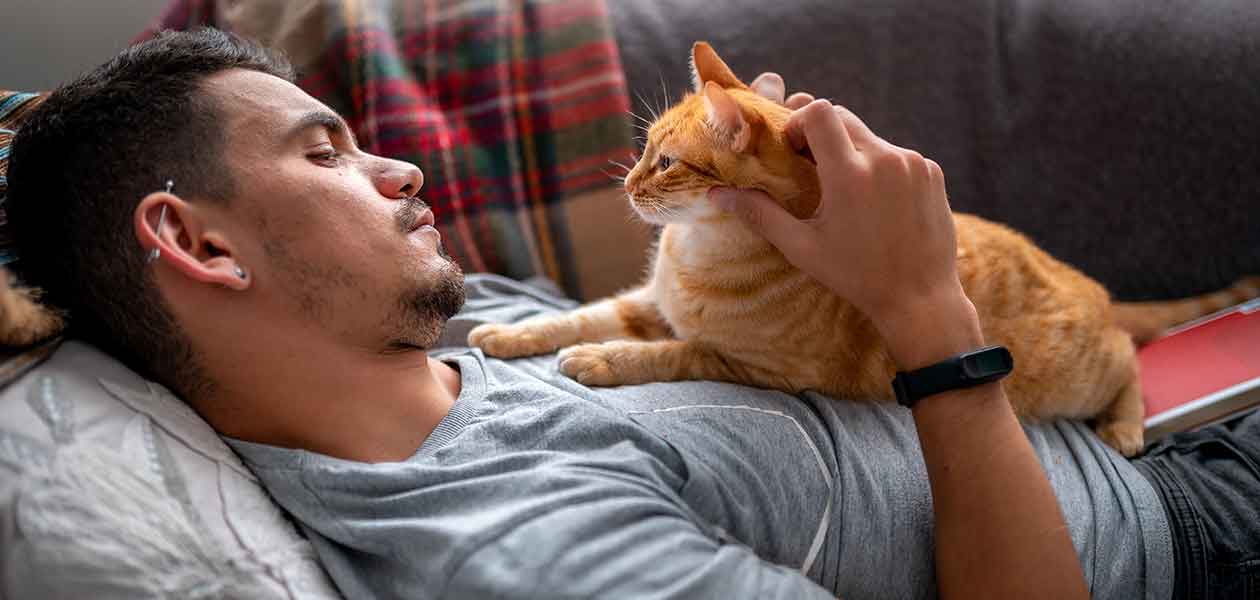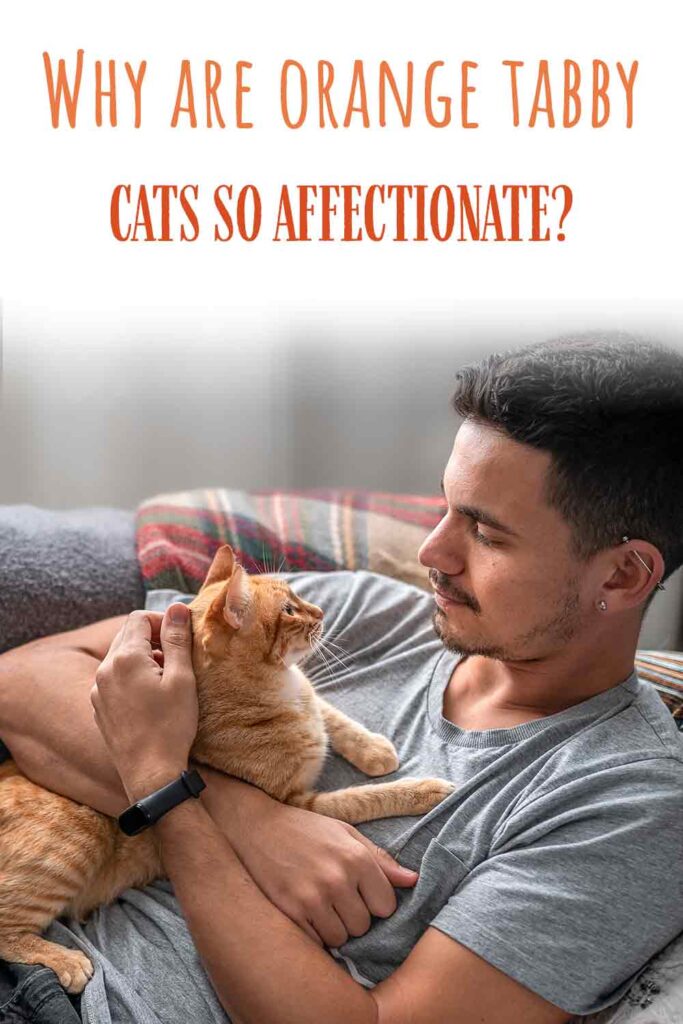
Why are orange tabby cats so affectionate? Orange tabbies have a reputation for being the friendliest cats.
But, there is no proven link between orange tabbies’ coat color and their temperament.
Many people are interested to find out if choosing an orange tabby cat is a sure fire way to secure a devoted new pal.
In this article, we find out if the reputation is true.
Why Are Orange Tabby Cats So Affectionate?
Do you know an especially big hearted orange tabby cat?
Perhaps there are several living on your block, each one friendlier than the last.
For some people, the thought of a ginger tabby cat is synonymous with warm greetings, purring, and cheek rubs.

But is this image really representative of all orange tabby cats? Why are orange tabby cats so affectionate?
Are they all affectionate? And if so, is it something about their coat which makes them that way?
Affection In Cats
We humans have been sharing our hearts and our home lives with cats for thousands of years.
But despite this, there’s been relatively little research conducted about what makes them tick.
In 2017, a team of scientists in Australia proposed that cats’ personalities are made of of five elements:
- Openness
- Conscientiousness
- Extraversion
- Agreeableness
- Neuroticism
Other Opinions
Whilst a rival team in the same year identified six dimensions of feline personality:
- Playfulness
- Nervousness
- Amiability
- Dominance
- Demandingness
- Gullibility
Affection consists of extraversion and agreeableness in the first study, and falls within amiability in the second study.
Unfortunately though, neither study looked for a connection between those traits, and cats’ coat color.
Which begs the question…
Are Orange Tabby Cats More Affectionate?
Before we ask why are orange tabby cats so affectionate, we need to learn if this reputation is actually true.
In a survey of just under 200 people, orange tabby cats were more likely than any other color to be described as friendly.
But despite this, there isn’t presently any evidence proving a link between coat color and personality in cats.
Which isn’t to say that one definitely doesn’t exist.
Links Between Coat Color and Other Traits
In Cocker Spaniel dogs, evidence has been put forward of a link between brown coat color and increased aggression.
And in other cats, white coat color is linked to deafness, which can indirectly shape their temperament too.
So without further research it’s impossible to say whether our perception of orange tabbies is collective human bias, or a genuine phenomenon. And if it is real, what causes it.
But we can speculate about some things which might be responsible, and some other things which definitely aren’t.
The Significance Of Sex
It’s a quirk of cat color genetics that around three quarters of orange tabby cats are male.
That’s because the genes for coat color are carried on the X sex chromosome.
Male cats only have one copy of the X chromosome, and if the color gene on it produces orange fur, they’ll be an orange cat.
Female cats have two X chromosomes. And if both carry the gene for orange coat color, they’ll be orange.
But if one carries the orange gene, and one carries genes for black/brown fur instead, they turn out tortoiseshell!
So most orange tabby cats are male, but are male cats more affectionate than females?
There’s very little evidence to prove this either way.
One study has suggested that spayed females are more demanding, needy and loud than non-neutered males.
But there weren’t enough non-spayed females or neutered males included in the study to state the impact of sex for sure.
And many vets and animal agencies agree that there are no consistent differences between the sexes.
Why Are Orange Tabby Cats So Affectionate – Is It Their Breed?
Could it be that orange tabby cats are so affectionate due to their breed?
Well, in fact the orange tabby is not a cat breed in it’s own right.
Several of our best loved cat breeds can have orange tabby coats, including Persians, Maine Coons and British Shorthair cats.
Furthermore, Domestic Shorthair and Domestic Longhair cats – which don’t have pedigree heritage, but make up the vast majority of pet cats – can also have orange tabby coats.
A Closer Look
In purebred orange tabby cats, their breed will be a better predictor of their character than their color.
Persian and British Shorthair cats for example have been specifically bred as companion animals for generations. They are particularly affectionate to their human family.
Temperament is much harder to predict in Domestic Shorthair and Longhair cats.
An ultra-affectionate orange tabby Domestic Shorthair might owe their good nature to genetics, or the way they were raised.
So we’ll look at the importance of how they’re raised next!
The Role Of Socialization
Socialization in pet cats describes the way that their earliest experiences shape the way they react to those things for the rest of their lives. This includes interactions with different types of people, places, and other pets.
For example, imagine a kitten who meets lots of men, women and children of all ages, and has a rollicking good time with all of them. Playing games and receiving treats, and never hurt or pushed into anything which frightens them.
They are likely to grow up with a positive impression of people generally, and greet most people they meet with warmth and affection
This is true of all cats, including orange tabbies of every breed.
And the best thing is that it’s something you can secure for any kitten of yours as well.
In the great ‘nature vs nurture’ debate, socialisation is nurture, and the way you raise a kitten will shape how affectionate they are as an adult.
But there is still one last thing to consider when answering why are orange tabby cats so affectionate?
Maybe It’s Just Them
Just like humans, every cat is an individual, with their own unique and infinitely complex inner world.
Some cats are inclined to be introverted and rather self sufficient.
Others are naturally genial extroverts, who regularly seek out company and cuddles.
This is true of all breeds, all coat colors and all patterns.
Some factors, like the temperament of their parents, the overall characteristics of their breed, or the way their raised will shape and influence how a cat turns out.
But sometimes there remains a part of them which is just totally intrinsic.
And that’s equally true in orange tabby cats.
Why Are Orange Tabby Cats So Affectionate?
Orange tabby cats have a reputation for being among the most loving felines.
But there’s no scientific evidence which links the orange tabby coat to having a more doting personality.
And it’s certainly not the only thing which affects a cat’s personality.
Which means that whether you choose an orange tabby or not, if it’s a lovebug you’re looking for, you’re just as likely to get one!
Do You Have A Cuddly Orange Tabby?
Or perhaps they express their devotion in some other way?
Let us know about them in the comments box down below. What do you think made them so affectionate?
Readers Also Liked
- Black and Orange Cat
- Orange And White Cat Colors And Patterns
- Mackerel Tabby
- Yellow Tabby Cat
- Tabby Cat Facts
- Blue Tortoiseshell Cat
- Black Tortoiseshell Cat
- What To Do With Your Cat During Housing Showings
References & Further Reading
- Litchfield et al. The ‘Feline Five’: An exploration of personality in pet cats. Plos One. 2017.
- Bennett et al. Assessment of domestic cat personality, as perceived by 416 owners, suggests six dimensions. Behavioral processes. 2017.
- Delgado et al. Human Perceptions of Coat Color as an Indicator of Domestic Cat Personality. Anthrozoos. 2012.
We have a tabby shorthair orange cat and a American short hair grey cat. The grey cat was raised by my son at 5 weeks old, got the Tabby at 6 months old. The Tabby is so affectionate to females especially. He loves to cuddle, rub noses, pets my face, and sits on my lap whenever he can. The grey cat does not like to be touched, hates being brushed, only attentive to humans when he wants to be fed. He does cry when we leave the house. They are so different.
My Charlie is an orange tabby. At times he’s so mean to my Grey ta by cat.. their 2 months apart in age to the day. My Smokey is very timed and shys away from people but wants me to love on her all the time. Charlie is dominant and wants all the attention. He let’s me know when they need food or water. He also let’s me know when their litter needs changing no matter what. Charlie loves Smokey but he has to be the one to start cleaning them or playing. Yes he seems to be very spoiled but only because Smokey hides most of the time from Charlie or people. When someone comes Smokey is gone until they leave, Charlie on the other hand waits a couple minutes then makes his appearance noticed to everyone. When they get treats, Charlie only eats a couple and then watches Smokey eat all of hers and his. Love my babies with all my heart. They came into my life after my husband pasted for 5 years and a year after I loss my dog Lucky. They give me alot of comfort and championship, we are together 24/7 unless I go somewhere fir a short time. They travel with me when I go far away, never do I leave them home by themselves. They are my babies for sure.
My boy Buddy is a lap baby. He also thinks that people come to see him because he has to greet everyone that comes to the door. He also wants to follow you everywhere. He’s a red and white tabby shorthair. Always purring. My grey and white tabby shorthair and black shorthair both really couldn’t care less about people.
Our ginger boy Rocky is an absolute sweetheart, so gentle , kind and loving. He loves to cuddle up and kiss. My last ginger was exactly the same…. I love my tingers
Years ago my dad brought home a small very sick little kitten left in a ditch to die. We called him Rusty. Rusty got better and one day gave birth to two orange kittens. she would only mate with another orange cat. One Kitten was a dark orange and the other was a pale orange with white on his chest. We called them Tiger and angle. The mother cat would wash her big boys under the neck and always treated them like they were still her babies. I am now looking for an orange kitten. I have to cats now, one a long hair grey and female
spade and a fixed black and white short haired cat. They get along great and are inside cats and play together all the time.